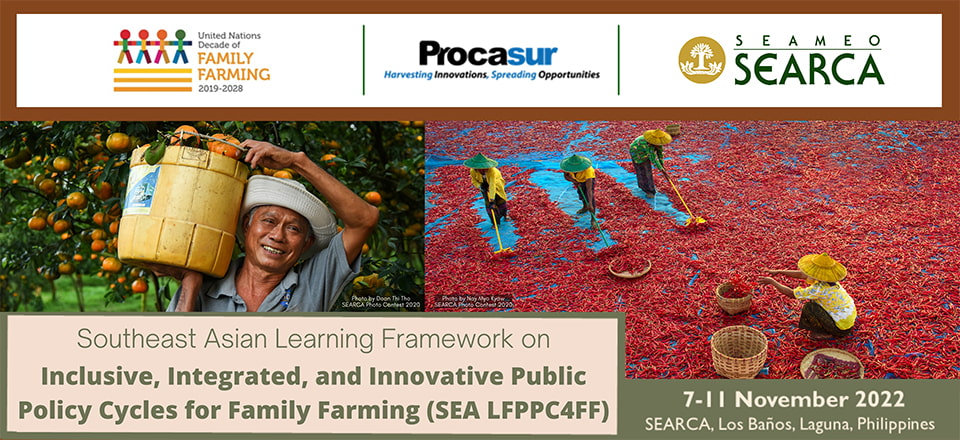
Contents
Background and Rationale
Family farmers constitute a key sector driving our food systems. But their sector reels from crisis after crisis, among them the socio-economic impacts of the war in Ukraine and the COVID-19 pandemic on top of disasters wrought by the changing climate amid the growing vulnerability and degradation of our natural environment. These contemporary challenges underscore the necessity of an enabling environment paved by better public policy solutions subjected to rigorous scrutiny, debate, and analysis to ensure our thriving food systems largely driven by family farming (FF).
During this United Nations (UN) Decade of Family Farming (2019-2028), the Southeast Asian Regional Center for Graduate Study and Research and Agriculture (SEARCA) and Procasur, with technical assistance from the UN Food and Agriculture Organization(FAO), jointly offer the Southeast Asian Learning Framework on Inclusive, Integrated and Innovative Public Policy Cycles for Family Farming.
Learning Objectives
The modular training program (MTP) will equip participants to:
- Understand the relevance of public policies for family farming sectors within the current, complex context of food systems and the rural sector
- Assess, reflect on, dialogue, and evaluate existing solutions and ways to develop proposals and policy responses to problems and opportunities faced by family farmers
- Demonstrate adeptness with tools, instruments, and competencies in addressing public policy issues relevant to family farming and family farming-centered food systems
- Promote multistakeholder work and the capacity to disseminate knowledge and strengthen coalitions and linkages to create an enabling environment for the benefit of family farming
Intended Participants
- Men and women leaders of family farming organizations
- Technical teams of relevant public institutions
- Young leaders of rural networks and organizations
Expected Course Outcome
Enhanced conceptual, methodological, and instrumental competence of 16+ leaders, men and women, from family farming organizations and public institutions in Southeast Asia participating and influencing the cycle of emergence, design, formulation, implementation, and evaluation of effective public policies that address the contemporary challenges facing the rural sector and food systems.
Course Duration
The Southeast Asian course will run on 7-11 November 2022, comprising presentations and discussion with experts and facilitated group activities.
Modules
The five-day course comprises 11 modules as follows:
- Analysis of the current challenges of food systems
- Family farming in the national and regional contexts
- The concept of public policies and the family farming policy field
- Actor mapping and the public policy cycle
- Policy agenda setting
- Policy formulation
- Policy adoption
- Policy implementation
- Monitoring and evaluation
- Application and analytical reflection
- Planning and route to the future
Learning Methods
Participants will listen to lectures and interact with experts, resource persons, and each other; watch short videos; work on exercises/assignments in groups; and share experiences, among others, during the five-day training.
Training Agenda
| Time | 7 Nov | 8 Nov | 9 Nov | 10 Nov | 11 Nov |
|---|---|---|---|---|---|
| (Mon) | (Tue) | (Wed) | (Thu) | (Fri) | |
| 8:45 a.m. | Registration | ||||
| 9:00 a.m. | Registration | Recap of Day 1 | Recap of Days 1–2 | Recap of Day 3 | 4. Analytical Reflection: Public Policy Process for the Support of Family Farming in the National Context |
| 9:30 a.m. | Welcome and Opening | 2. Principles of Public Policies for Family Farming 2.1. The Concept of Public Policy | 3. The Policy Cycle Model 3.1. Agenda-setting | 3.3. The Adoption Stage | |
| 10:00 a.m. | Participants' Unfreezing with each other | ||||
| 10:30 a.m. | Course Orientation | ||||
| 10:30 a.m. | Coffee/Tea | ||||
| 11:00 a.m. | 1. Context Analysis 1.1 Analysis of the Challenges of Food Systems | 2.2. Introducing the Policy Cycle Model | 3.1. Continuation | 3.3. Policy Implementation | 5. Contextualized Planning: Public Policy Forum Planning |
| 12:00 p.m. | Lunch | ||||
| 1:30 p.m. | Continuation of 1.1 | 2.3. Public Policies for Family Farming: National Trajectories, Beneficiaries, and Themes | 3.2. The Formulation Stage | 3.4. Continuation | 5. Continuation |
| 2:30 p.m. | 1.2. Family Farming in the Country Context | ||||
| 3:10 p.m. | Coffee/Tea | ||||
| 3:30 p.m. | Continuation of 1.2 | 2.4. Actors and Institutions in Policy Process | 3.2. Continuation | 3.5. Monitoring and Evaluation | Wrap-up |
| 5:30 p.m. | Free | ||||